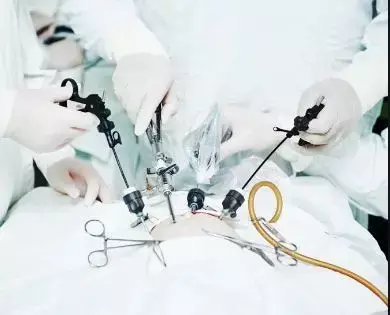- Home
- Medical news & Guidelines
- Anesthesiology
- Cardiology and CTVS
- Critical Care
- Dentistry
- Dermatology
- Diabetes and Endocrinology
- ENT
- Gastroenterology
- Medicine
- Nephrology
- Neurology
- Obstretics-Gynaecology
- Oncology
- Ophthalmology
- Orthopaedics
- Pediatrics-Neonatology
- Psychiatry
- Pulmonology
- Radiology
- Surgery
- Urology
- Laboratory Medicine
- Diet
- Nursing
- Paramedical
- Physiotherapy
- Health news
- Fact Check
- Bone Health Fact Check
- Brain Health Fact Check
- Cancer Related Fact Check
- Child Care Fact Check
- Dental and oral health fact check
- Diabetes and metabolic health fact check
- Diet and Nutrition Fact Check
- Eye and ENT Care Fact Check
- Fitness fact check
- Gut health fact check
- Heart health fact check
- Kidney health fact check
- Medical education fact check
- Men's health fact check
- Respiratory fact check
- Skin and hair care fact check
- Vaccine and Immunization fact check
- Women's health fact check
- AYUSH
- State News
- Andaman and Nicobar Islands
- Andhra Pradesh
- Arunachal Pradesh
- Assam
- Bihar
- Chandigarh
- Chattisgarh
- Dadra and Nagar Haveli
- Daman and Diu
- Delhi
- Goa
- Gujarat
- Haryana
- Himachal Pradesh
- Jammu & Kashmir
- Jharkhand
- Karnataka
- Kerala
- Ladakh
- Lakshadweep
- Madhya Pradesh
- Maharashtra
- Manipur
- Meghalaya
- Mizoram
- Nagaland
- Odisha
- Puducherry
- Punjab
- Rajasthan
- Sikkim
- Tamil Nadu
- Telangana
- Tripura
- Uttar Pradesh
- Uttrakhand
- West Bengal
- Medical Education
- Industry
Idiopathic, acute peritonitis treated with laparoscopic peritoneal toileting: case report

A case of acute peritonitis of unclear origin has been successfully treated by the Laparoscopic approach, according to a recently published report in the International Journal of Surgery Case Reports.
Peritonitis refers to the peritoneal inflammation and a common cause of surgical emergency which was traditionally managed by exploratory laparotomy. The paramount concern in management is to relieve the patient from the toxins and bacterial loads from the abdominal cavity and control of the source as early as possible. Any improper evaluation and interventional delay might have a fatal outcome.
Emergency laparotomy exploration is indicated to control the source of sepsis even in diagnostic uncertainty. It is an accepted fact that laparoscopy under local anesthesia is also useful in acute peritonitis to visualize the whole abdomen and pelvis providing the diagnosis which might be missed in conventional imaging.
A 32-years-old man was admitted to Jahurul Islam Medical College Hospital, Bangladesh, with complaints of severe and diffuse abdominal pain associated with mild fever for the last 8 h. He reported no bowel movement within the last 24 h and respiratory discomfort for one and half an hour. His vitals were stable with signs of mild dehydration. His abdomen was not distended but it was tender all over.
Physicians suspected it to be a case of idiopathic secondary acute peritonitis. Initial treatment started with an intravenous crystalloid infusion with antibiotics (cefoperazone + metronidazole) and analgesics.
Radiographic investigation (with Plain chest and abdominal radiograph) with abdominal ultrasound appeared normal. Hematological and biochemical parameters revealed neutrophilia, mildly raised serum lipase, normal liver and renal function, and no electrolyte imbalance.
CT abdomen revealed a significant amount of collection in the right sub-phrenic, subdiaphragmatic, and pelvic area, suggesting ascites, but no definite diagnosis could be made.
Doctors planned a Diagnostic laparoscopy proceeded with modified direct initial trocar access through the umbilicus. Appendicectomy was performed followed by thorough peritoneal irrigation with 2 L of warm normal saline and finally, a drain tube (DT) was placed in the pelvis. Surprisingly the etiology remained unclear. Following laparoscopy, he responded well with an uneventful recovery.
Exploratory Laparotomy has been the mainstay of surgical management in acute peritonitis. And laparoscopy had been considered relatively contraindicated because of poor vision, inadequate peritoneal toileting, increased sepsis, time-consuming, post-operative adhesions, and late complications. But the recent trend is inclining more towards the laparoscopic management in acute peritonitis.
The doctors highlighted that "This case report might encourage many surgeons to consider the laparoscopic approach in peritonitis with confidence and to perform further studies."
For the full article click on the link: https://doi.org/10.1016/j.ijscr.2020.05.089
Primary source: International Journal of Surgery Case Reports
Dr Satabdi Saha (BDS, MDS) is a practicing pediatric dentist with a keen interest in new medical researches and updates. She has completed her BDS from North Bengal Dental College ,Darjeeling. Then she went on to secure an ALL INDIA NEET PG rank and completed her MDS from the first dental college in the country – Dr R. Ahmed Dental College and Hospital. She is currently attached to The Marwari Relief Society Hospital as a consultant along with private practice of 2 years. She has published scientific papers in national and international journals. Her strong passion of sharing knowledge with the medical fraternity has motivated her to be a part of Medical Dialogues.
Dr Kamal Kant Kohli-MBBS, DTCD- a chest specialist with more than 30 years of practice and a flair for writing clinical articles, Dr Kamal Kant Kohli joined Medical Dialogues as a Chief Editor of Medical News. Besides writing articles, as an editor, he proofreads and verifies all the medical content published on Medical Dialogues including those coming from journals, studies,medical conferences,guidelines etc. Email: drkohli@medicaldialogues.in. Contact no. 011-43720751


